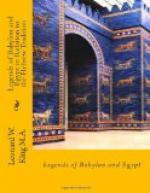(2) In the Atrakhasis
version, dated in the reign of
Ammizaduga, Col.
I, l. 5, contains a reference to the “cry”
of men when Adad the
Storm-god, slays them with his flood.
It is probable that the Sumerian Version, in the missing portion of its Fourth Column, contained some account of Ziusudu’s entry into his boat; and this may have been preceded, as in the Gilgamesh Epic, by a reference to “the living seed of every kind”, or at any rate to “the four-legged creatures of the field”, and to his personal possessions, with which we may assume he had previously loaded it. But in the Fifth Column we have no mention of the pilot or of any other companions who may have accompanied the king; and we shall see that the Sixth Column contains no reference to Ziusudu’s wife. The description of the storm may have begun with the closing lines of the Fourth Column, though it is also quite possible that the first line of the Fifth Column actually begins the account. However that may be, and in spite of the poetic imagery of the Semitic Babylonian narrative, the general character of the catastrophe is the same in both versions.
We find an equally close parallel, between the Sumerian and Babylonian accounts, in the duration of the storm which accompanied the Flood, as will be seen by printing the two versions together:(3)
SUMERIAN VERSION SEMITIC VERSION
When for seven days, for seven For six days and nights nights, The flood had overwhelmed the The wind blew, the flood, the land, tempest overwhelmed the land. When the wind-storm had driven When the seventh day drew near, the great boat over the the tempest, the flood, ceased mighty waters, from the battle In which it had fought like a host. The Sun-god came forth shedding Then the sea rested and was light over heaven and earth. still, and the wind-storm, the flood, ceased.
(3) Col. V, ll.
3-6 are here compared with Gilg. Epic, XI,
ll. 128-32.
The two narratives do not precisely agree as to the duration of the storm, for while in the Sumerian account the storm lasts seven days and seven nights, in the Semitic-Babylonian Version it lasts only six days and nights, ceasing at dawn on the seventh day. The difference, however, is immaterial when we compare these estimates with those of the Hebrew Versions, the older of which speaks of forty days’ rain, while the later version represents the Flood as rising for no less than a hundred and fifty days.




